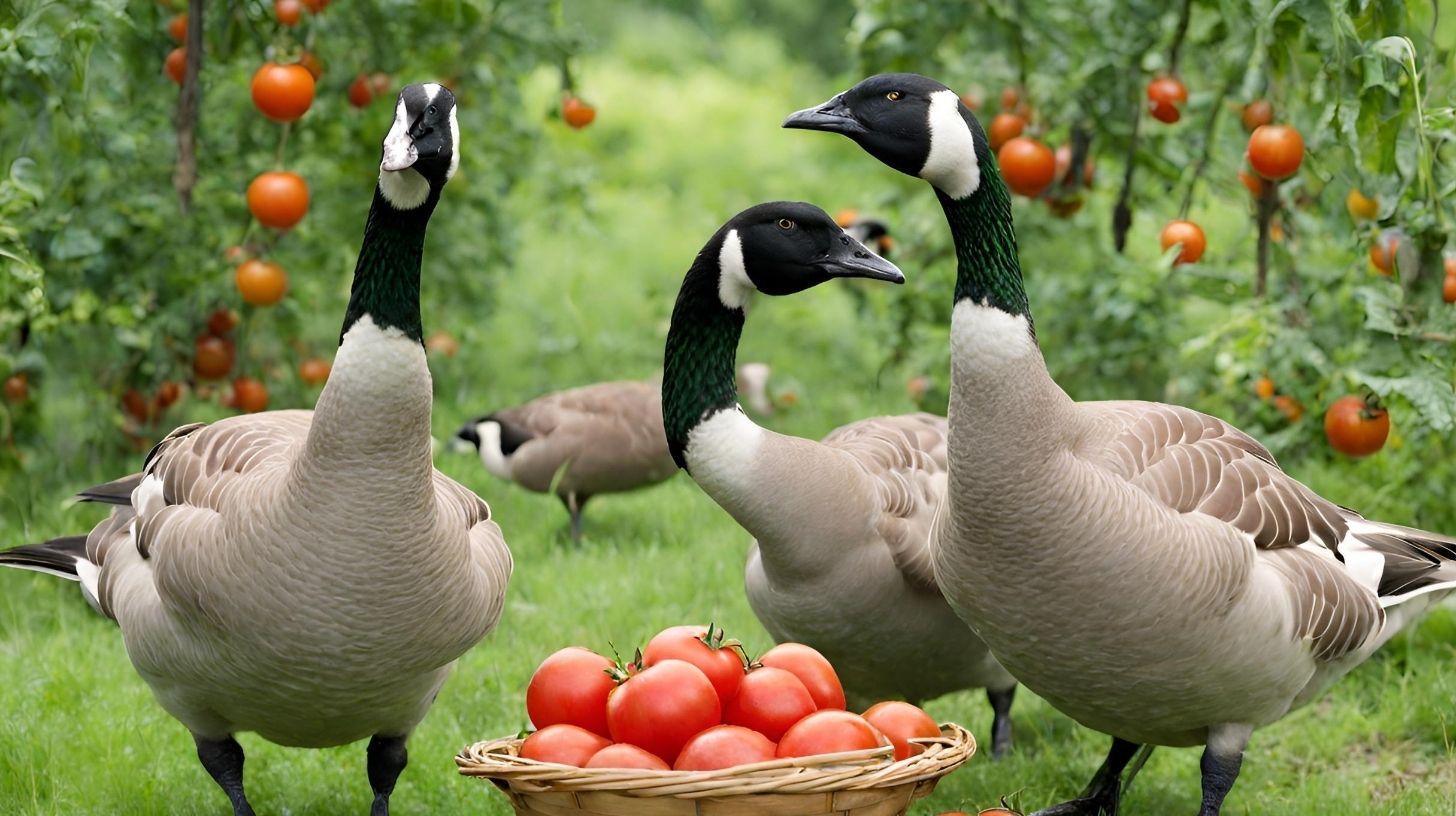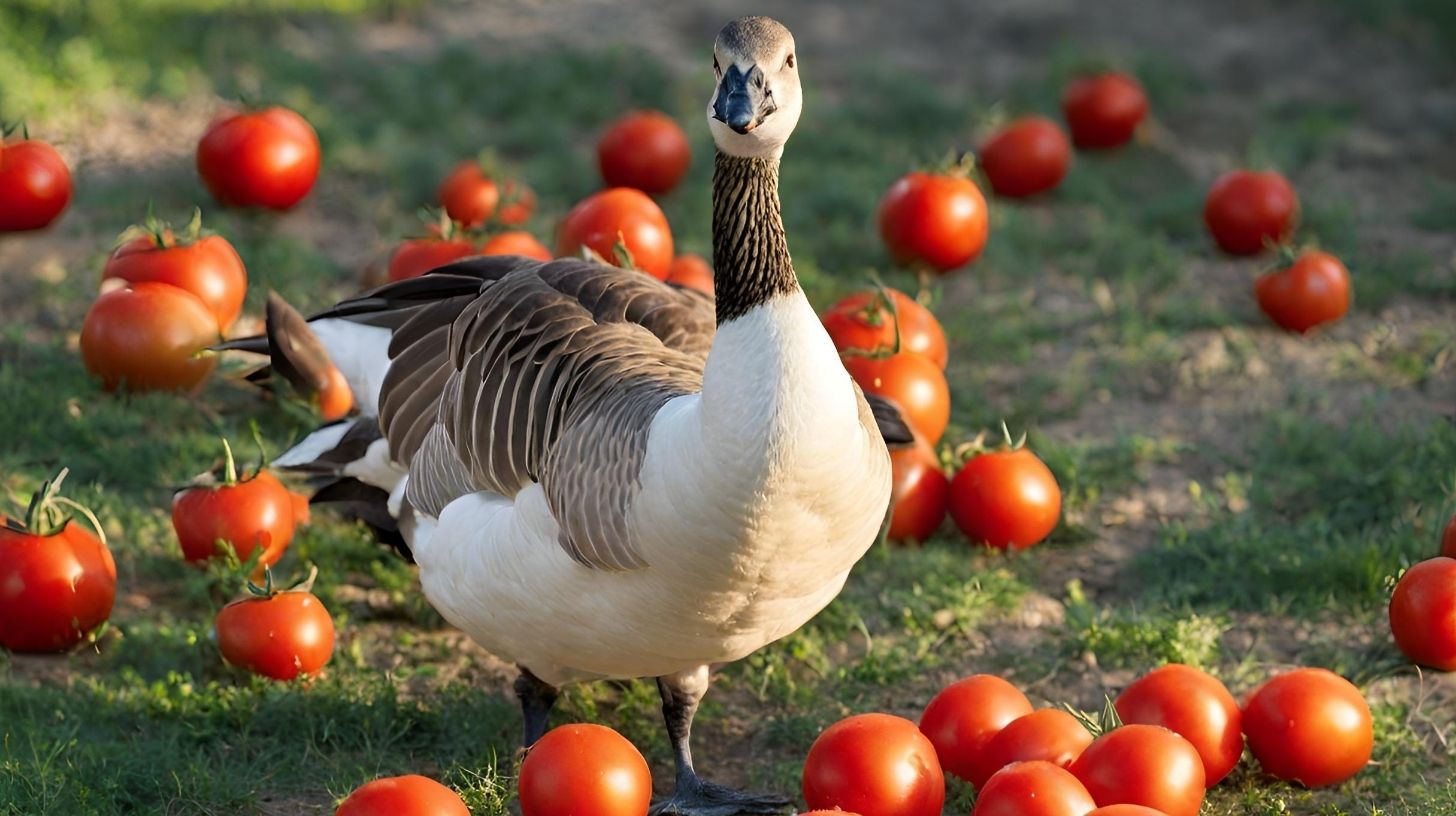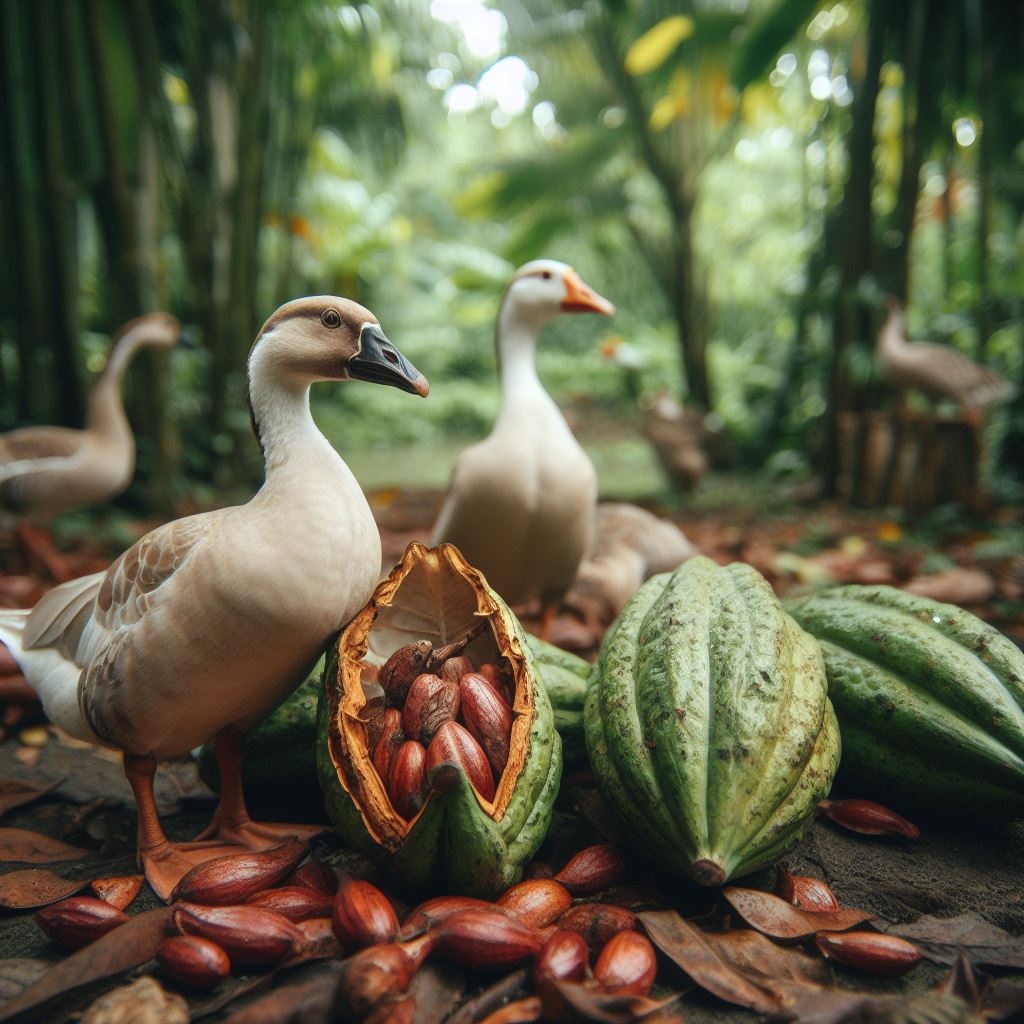Can Geese Eat Tomatoes? Benefits And Precautions for Geese

Daftar isi:
Geese can eat tomatoes in moderation as an occasional treat, though tomatoes should not make up a significant portion of their diet. While tomatoes are not toxic to geese, they do contain mildly toxic compounds that can cause stomach upset if consumed in large quantities. With some precautions, tomatoes can be fed to geese safely in limited amounts.
Key Takeaways:
- Tomatoes contain mildly toxic compounds like solanine and glycoalkaloids that can cause stomach upset in large doses.
- Geese can eat both ripe and unripe tomatoes, including cherry and grape varieties, though overripe tomatoes should be avoided.
- Feed tomatoes to geese in moderation as an occasional treat, no more than once or twice a week.
- Always monitor geese when offering new foods to watch for signs of stomach upset or other adverse reactions.
- Provide geese with a balanced diet including poultry feed, greens, and insect protein sources.
 Are Tomatoes Safe for Geese to Eat?
Are Tomatoes Safe for Geese to Eat?
Tomatoes are members of the nightshade family of plants, which includes eggplant, peppers, and potatoes. All nightshades contain glycoalkaloids, naturally occurring pesticides that can be toxic to geese and other animals in large doses.
The most common glycoalkaloids found in tomatoes are solanine and chaconine. Solanine is found in all parts of the tomato plant, especially in the leaves and stems. Chaconine is typically concentrated in the vines and foliage.
Ripe tomatoes contain only low to moderate levels of these glycoalkaloids in the flesh and skin. But unripe green tomatoes and overripe tomatoes have higher glycoalkaloid content that can cause toxicity.
While solanine and chaconine at normal levels are not harmful to geese, consumption of very large quantities can result in stomach upset, diarrhea, headache, and nausea.
So although tomatoes are not strictly toxic to geese, it’s best to feed them in moderation to avoid glycoalkaloid poisoning. Monitor geese for any signs of stomach upset after introducing tomatoes.
Are Tomatoes Good for Geese?
Tomatoes do provide some beneficial nutrients for geese, meaning they can be fed as an occasional treat in limited amounts.
Ripe tomatoes are a good source of:
- Vitamin C
- Vitamin A
- Vitamin B6
- Potassium
- Lycopene
These vitamins and minerals support goose immune function, vision, digestion, and overall health.
The red pigment lycopene is a powerful antioxidant that protects geese from cell damage. Tomatoes contain much higher levels of lycopene compared to other fruits and vegetables.
However, tomatoes should not become a staple in a goose’s diet. Poultry feed, greens, and insects should provide the bulk of their nutritional needs.
Think of tomatoes more like candy – fine for a treat here and there, but too much can cause tummy troubles!
What Types of Tomatoes Can Geese Eat?
Geese can eat most common tomato varieties, including:
- Beefsteak
- Roma
- Cherry
- Grape
- Heirloom
The main consideration is the ripeness of the tomato. Fully ripe tomatoes are safest for geese.
Underripe green tomatoes and overripe tomatoes should be avoided, as they contain higher glycoalkaloid levels.
Some specific guidelines on tomato ripeness:
- Ripe tomatoes – Red, orange, or yellow tomatoes that are fully ripe can be fed to geese in moderation.
- Unripe tomatoes – Hard, green tomatoes are higher in toxins. Allow any green tomatoes to fully ripen before feeding to geese.
- Overripe tomatoes – Old, mushy tomatoes that are past prime can also cause stomach upset. Discard any spoiled, damaged, or moldy tomatoes.
When in doubt, focus on firm, fresh ripe tomatoes free of blemishes or soft spots. Cherry and grape tomatoes make a nice treat size for geese.
Can Geese Eat Tomato Leaves and Vines?
Avoid feeding geese the leaves, stems, and vines of tomato plants. These parts contain the highest levels of the glycoalkaloids solanine and chaconine.
While geese may nibble on tomato plants in fields, refrain from offering the foliage as feed. Ripe tomato flesh and skins are safest.
 How to Feed Tomatoes to Geese
How to Feed Tomatoes to Geese
When introducing tomatoes to your flock for the first time, follow these tips:
- Start with just a few small pieces per goose.
- Observe their reaction and make sure no signs of stomach upset occur.
- If all goes well, gradually increase the amount at subsequent feedings.
- Chop or slice tomatoes into bite-sized pieces for easier eating.
- Offer tomatoes just 1-2 times per week as an occasional treat.
- Always provide plenty of fresh water for geese to wash down high-acid foods like tomatoes.
- Remove any uneaten tomato remains within 1 hour to prevent spoilage.
Tomatoes should never comprise more than 10% of a goose’s overall diet. Their main nutrition should come from:
- Commercial poultry feed
- Dark leafy greens like kale, spinach, Swiss chard
- Insect protein sources like mealworms
Follow these feeding guidelines for adult geese:
- Poultry feed: 1-2 cups per day
- Greens: 1-2 cups chopped per day
- Treats like tomatoes: 1-2 times weekly, in limited amounts
Spread feedings out through the day, rather than offering one large meal. This promotes healthy digestion.
Always provide geese with ample fresh drinking water. Change water at least twice daily to keep it clean.
Signs of Tomato Toxicity in Geese
Monitor your flock closely when introducing new foods like tomatoes. Discourage geese from eating nightshade plants growing in your garden.
Be alert for these signs of tomato or nightshade toxicity:
- Excessive drooling
- Difficulty swallowing
- Impaired vision or dilation of pupils
- Diarrhea
- Abdominal pain
- Weakness
- Muscle tremors
- Respiratory distress
If any goose appears ill after eating tomatoes, immediately remove the tomatoes and call your veterinarian. Prompt treatment improves chances for a full recovery.
With proper precautions, most geese can enjoy an occasional ripe tomato as a healthy treat. Just be sure to feed tomatoes in moderation. A varied diet is key to keeping geese happy and healthy.
Frequently Asked Questions About Feeding Tomatoes to Geese
Can baby geese eat tomatoes?
Yes, goslings can eat ripe tomatoes in small amounts. Follow the same feeding guidelines as for adult geese. Chop tomatoes into tiny pieces for easier eating.
Avoid giving tomatoes to goslings under 6 weeks old. Their digestive systems are still developing and may be more sensitive.
How many tomatoes can a goose eat?
An average adult goose should eat no more than 1-2 slices of ripe tomato, two to three times per week. Adjust quantities based on the size of your tomatoes and geese.
Observe geese closely and discontinue tomatoes if any stomach upset occurs. Always feed tomatoes as a supplement, not a main diet component.
What fruits and vegetables can geese eat?
In addition to tomatoes, geese can enjoy a variety of produce in moderation, including:
- Grapes, blueberries – high in antioxidants
- Lettuce, kale – provides vitamins
- Apples, melons – high in fiber and water content
- Squash, sweet potatoes – great for carotenoids like vitamin A
Avoid avocados, onions, garlic, and citrus fruits as these are toxic to geese. Introduce new fruits and veggies slowly and watch for any adverse reactions.
What human foods are poisonous to geese?
Geese cannot tolerate these common human foods:
- Chocolate – contains toxic theobromine
- Caffeine – can be fatal to birds
- Alcohol
- Avocados – contain persin toxin
- Onions, garlic, chives – damages red blood cells
- Dried beans or grains – can cause choking/crop impaction
Avoid feeding geese any people food unless specifically approved for waterfowl. Stick to produce items listed above for treats.
What vegetables are good for geese?
Ideal veggies for geese include:
- Kale, spinach, lettuce – nutritious greens
- Sweet potato, squash, peas, corn – high in vitamin A
- Carrots, beets – great for fiber
- Broccoli, cauliflower – supports immune health
- Cucumber – provides hydration
Chop produce into small pieces before feeding. Always supervise geese when offering new veggies.
Conclusion
Tomatoes make a safe, nutritious occasional treat for geese when fed in moderation. Both ripe and unripe tomatoes can be offered, though overripe tomatoes should be avoided. Introduce tomatoes slowly, limit treat feeding to a few times weekly, and monitor geese for any signs of gastrointestinal upset. With some basic precautions, you can feel comfortable offering your flock a few bites of this garden delight!
Welcome. I’m Adreena Shanum, the proud owner of this website, and I am incredibly passionate about animals, especially poultry. I founded adreenapets.com as a labor of love, stemming from my desire to share my knowledge and experiences with poultry enthusiasts worldwide.




